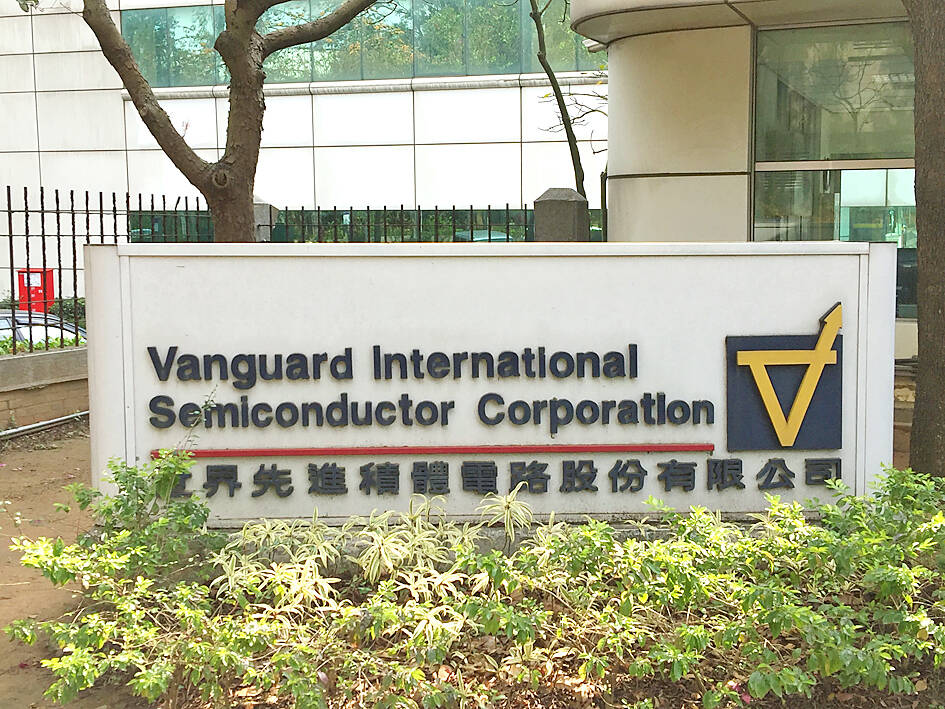Vanguard International Semiconductor Corp (世界先進) yesterday halved its capital expenditure budget for this year as weak demand continued to push down its factory utilization to about 50 percent last quarter, given a prolonged inventory correction cycle.
The Hsinchu-based contract chipmaker plans to spend NT$3.8 billion (US$121.63 million) on new equipment this year, compared with NT$7.6 billion last year. As customers have been cautious in ordering, Vanguard’s factory usage has drifted into a downward spiral over the past few quarters to 53 percent last quarter.
The chipmaker, which operates less-advanced 8-inch fabs, said it has been assessing the feasibility of building a 12-inch fab, but so far, no conclusion has been made, it said.

Photo: Grace Hung, Taipei Times
“In the face of macroeconomic uncertainty, geopolitical and other factors, along with an ongoing inventory adjustment cycle for certain electronics segments, Vanguard will strictly manage its capacity expansion and cost control this year,” company president John Wei (尉濟時) told an online investors’ conference yesterday.
Automotive and industrial sectors customers are still grappling with a glut in inventory, Wei said.
Additionally, demand from TV panel customers is softening as the consumer electronics sector enters its slack season, he said.
Vanguard has a short order visibility of two to three months, he said.
However, the company thinks this year would be a year of growth, Wei said.
Revenue would grow at an annual pace of a high-single-digit percentage, or even better at a low-double-digit percentage, he said.
Revenue would grow quarter-on-quarter this year, he said.
Growth would most likely arrive in the second half of this year as TV vendors could start restocking panels ahead of the holidays, and new artificial intelligence (AI)-enabled applications such as servers, PCs and smartphones are set to stimulate chip demand, Vanguard vice president Claire Chen (陳姿鈞) said.
Additionally, the inventory issue plaguing the automotive sector should ease in the final quarter of this year as rising adoption of electric vehicles, particularly in China, should help shrink chip inventory, Chen said.
During this quarter, revenue is to drop by a single-digit percent sequentially from NT$9.67 billion, Vanguard said. About 5 or 6 percent of the revenue would stem from renegotiating the terms of some long-term supply agreements with customers, the company said.
Power management chips were the biggest revenue contributor last quarter, accounting for 60 percent. Display driver ICs used in TV display panels came next with a 25 percent share, the company said.
Gross margin is to dip further to between 21 and 23 percent this quarter after hitting a 10-year high of 23 percent last quarter. Wafer shipments would drop by 6 to 8 percent quarterly, the chipmaker said.
Vanguard yesterday reported 47 percent quarterly growth in net profit to NT$2.39 billion for last quarter, up from NT$1.62 billion — attributable to a massive asset gain of NT$1.9 billion.
Operating income last quarter plunged 43.7 percent quarter-on-quarter about 62 percent from a year ago to NT$938 million.
For last year as a whole, Vanguard saw its net profit more than halved to NT$7.37 billion from NT$15.28 billion in 2022. Earnings per share dropped to NT$4.43 from NT$9.07. Revenue tumbled 50 percent to NT$38.27 billion.

Intel Corp chief executive officer Lip-Bu Tan (陳立武) is expected to meet with Taiwanese suppliers next month in conjunction with the opening of the Computex Taipei trade show, supply chain sources said on Monday. The visit, the first for Tan to Taiwan since assuming his new post last month, would be aimed at enhancing Intel’s ties with suppliers in Taiwan as he attempts to help turn around the struggling US chipmaker, the sources said. Tan is to hold a banquet to celebrate Intel’s 40-year presence in Taiwan before Computex opens on May 20 and invite dozens of Taiwanese suppliers to exchange views

Application-specific integrated circuit designer Faraday Technology Corp (智原) yesterday said that although revenue this quarter would decline 30 percent from last quarter, it retained its full-year forecast of revenue growth of 100 percent. The company attributed the quarterly drop to a slowdown in customers’ production of chips using Faraday’s advanced packaging technology. The company is still confident about its revenue growth this year, given its strong “design-win” — or the projects it won to help customers design their chips, Faraday president Steve Wang (王國雍) told an online earnings conference. “The design-win this year is better than we expected. We believe we will win

Chizuko Kimura has become the first female sushi chef in the world to win a Michelin star, fulfilling a promise she made to her dying husband to continue his legacy. The 54-year-old Japanese chef regained the Michelin star her late husband, Shunei Kimura, won three years ago for their Sushi Shunei restaurant in Paris. For Shunei Kimura, the star was a dream come true. However, the joy was short-lived. He died from cancer just three months later in June 2022. He was 65. The following year, the restaurant in the heart of Montmartre lost its star rating. Chizuko Kimura insisted that the new star is still down

While China’s leaders use their economic and political might to fight US President Donald Trump’s trade war “to the end,” its army of social media soldiers are embarking on a more humorous campaign online. Trump’s tariff blitz has seen Washington and Beijing impose eye-watering duties on imports from the other, fanning a standoff between the economic superpowers that has sparked global recession fears and sent markets into a tailspin. Trump says his policy is a response to years of being “ripped off” by other countries and aims to bring manufacturing to the US, forcing companies to employ US workers. However, China’s online warriors